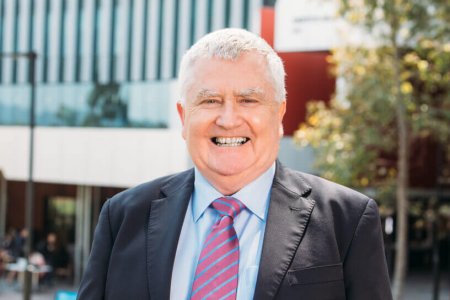‘Meet the Scientists’ is a series of interviews with researchers working on ME and chronic fatigue syndrome. We ask them about their current research and get to meet the people working to improve our health. The series introduces early career researchers through to interviewing scientists and clinicians who have been working on the problems for decades.
Professor Don Staines is co-director of the National Centre for Neuroimmunology and Emerging Diseases (NCNED) at Australia’s Griffith University, with Professor Sonya Marshall-Gradisnik. Together they have published more than 70 peer-reviewed papers on ME and chronic fatigue syndrome. Professor Staines is an author of the International Consensus Criteria for ME.
Professor Staines will be one of the keynote speakers at the Emerge ME/CFS International Research Symposium being held in Geelong in March 2019.
In November last year, NCNED hosted the ‘CFS/ME International Conference’ and announced they have been awarded $2.2 million from the Stafford Fox Foundation which will help researchers discover the pathology, develop a diagnostic test for GPs and treatment.
How long have you been working on ME and chronic fatigue syndrome?
I have had an interest in this debilitating illness for around 10 years from my then role as public health physician, Queensland Health. I then commenced further research in this area with my colleague Professor Sonya Marshall-Gradisnik.
Is there still a clinic at NCNED?
We had to make a decision to focus on the research in the best interests of all patients and this is where we dedicate our time. We have a wonderful relationship with patients in advancing the research priorities and this was the right decision.
Tell us about your early career, before working on CFS and ME.
I trained as a public health physician and this has given me an excellent background in investigating illness in the community. This is always in support of my clinical colleagues with whom I work closely.
As a public health physician my role was to investigate infectious and other disease outbreaks in the community. As many cases of CFS/ME follow such infectious episodes it was a natural area to continue research interest. Importantly it does not seem to matter which infections occur in patients, but rather there is an abnormal immune response which have many features in common.
In your experience as a clinician, has the name ‘chronic fatigue syndrome’ contributed to stigma?
This is a most unfortunate and poorly conceptualised name for this debilitating illness and we are keen to ensure the pathology of the illness is better described in its name.
You and Prof Marshall-Gradisnik have worked hard to ‘bust myths’ on social media, in the news and at conferences, what has been the response?
Our media work is a vital part of getting the message to the general community, to clinicians and to people with CFS/ME. Interestingly the media have responded accordingly and there is now much better awareness and sensitivity to the illness in the community.
Last year you spoke to parliamentarians in Canberra, is there enough understanding at the political level?
A number of prominent politicians have helped to drive awareness of the illness in the parliament. We have been able to present important research findings in the parliament as a result. Importantly governments overseas are gradually responding to the new discovery science as well.
Your work spans natural killer cells (and here), cytokines, brain function, dietary interventions, possible treatments, epidemiology and clinical guidelines. Which areas interest you the most? Which will have the most impact for patients?
I am interested primarily in the clinical and public health aspects of this illness, and the imperative to develop a diagnostic test. This is vital to enable clinicians to not only understand the illness but to manage and treat patients appropriately according to standardised clinical guidelines. Our research work is critical as our novel and pioneering laboratory findings are enabling us to develop a screening/diagnostic test.
What is holding back Australian biomedical research?
A great development is the growing support for research into CFS/ME and we take every opportunity to encourage this. Often seeing the impact of the illness on family members may prompt interest in funding research into CFS/ME.
How far away are we from being able to go to the GP to get a diagnostic blood test?
We continue to advance in this area and we are very mindful of just how important this will be to people with the illness.
When do you think there will be a treatment?
It is vitally important to test various drugs in a laboratory ‘in vitro’ setting. In due course we would like to see clinical trials when all safety data may be taken into account.
What are you most proud of in your career, so far?
Ensuring that research into CFS/ME is well accepted in the public health and clinical arenas has been a personal mission and I hope we have made some headway. As always it’s a team effort and we all bring different skills to work on this challenge.
What would you like to achieve?
Having a solid research program which gives everyone hope for appropriate treatments as soon as possible is my ideal. Having clinicians understand the illness will be important for this goal.
What do you enjoy doing, outside work?
I enjoy the beach, particularly with my daughter and twin grand daughters.
Read Prof Staine’s research publications.





